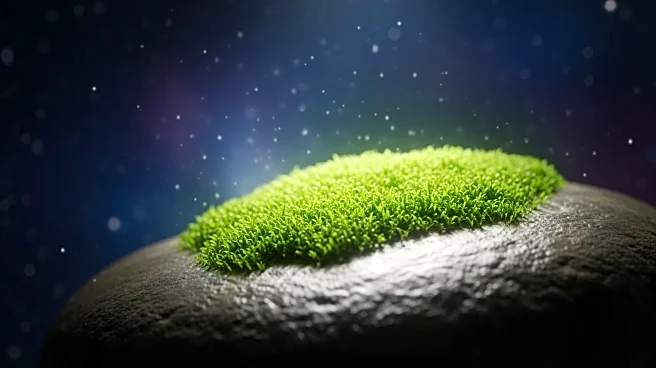What's Happening?
Researchers from Hokkaido University in Japan have conducted a groundbreaking experiment involving moss spores exposed to the harsh environment of space for nine months. The study, led by Tomomichi Fujita, aimed to test the resilience of moss spores,
specifically the sporophytes, against space conditions such as vacuum, microgravity, ultraviolet radiation, and temperature fluctuations. The spores were sent aboard Northrop Grumman's Cygnus cargo spacecraft to the International Space Station (ISS) in March 2022. After 283 days on the ISS exterior, the spores returned to Earth, revealing that over 80% survived and 89% of those were able to germinate. This unexpected durability suggests that life on Earth possesses intrinsic mechanisms to endure space conditions.
Why It's Important?
The findings from this experiment have significant implications for future space exploration and the potential for constructing ecosystems in extraterrestrial environments like the moon and Mars. The resilience of moss spores indicates that certain life forms from Earth could survive and possibly thrive in space, paving the way for sustainable life-support systems in space missions. This research contributes to the understanding of how life can adapt to extreme conditions, which is crucial for long-term space habitation and exploration. The ability to grow plants in space could support food production and oxygen generation, essential for human survival in space.
What's Next?
The study opens new avenues for research into constructing ecosystems in space environments. Future experiments may focus on other resilient organisms and their potential roles in extraterrestrial habitats. Researchers might explore the application of these findings in developing life-support systems for long-duration space missions. Additionally, the study could inspire further investigation into the genetic and cellular mechanisms that enable such resilience, potentially leading to advancements in biotechnology and space agriculture.
Beyond the Headlines
The resilience of moss spores in space raises ethical and philosophical questions about the adaptability of life and the potential for life beyond Earth. It challenges the notion of Earth's exclusivity as a life-supporting planet and encourages discussions on the ethical implications of terraforming other planets. The study also highlights the importance of preserving Earth's biodiversity, as it may hold the key to future space colonization efforts. Understanding the resilience of life forms could lead to innovations in biotechnology, with applications extending beyond space exploration to areas such as agriculture and medicine.















